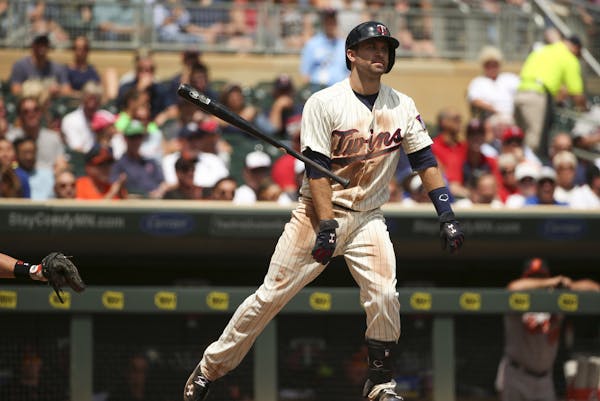It was five years ago this month that the Twins were announced as top bidders for Tsuyoshi Nishioka, paving the way for what would pan out as one of the worst high-profile moves in recent franchise history.
With Monday's news that the club has won negotiating rights to Byung-ho Park, some local fans are having flashbacks.
To some extent, the comparisons are understandable. The two players do have a number of things in common. For instance:
1) They hail from the same general area of the planet.
Well, actually, that's about it.
Park is a sturdy 230 pound power-hitting first baseman from South Korea. Nishioka was a speedy 175 pound slap-hitting middle infielder from Japan.
Park has spent his career playing in the Korea Baseball Organization (KBO). Nishioka played in Nippon Professional Baseball (NPB). They're completely different leagues, so their statistics are apples and oranges. They can't really be stacked against one another.
And even if you wanted to, a quick glance shows that the two players have demonstrated radically different profiles while playing on the other side of the world. Park is a career .281/.387/.564 hitter in KBO and he has smashed 105 home runs while driving in 270 runs over the past two seasons. Nishioka was a career .293/.364/.426 hitter in NPB who was coming off a BABIP-fueled batting title when the Twins acquired him. He had never hit 15 home runs in a season and outside of the big year that preceded his arrival in the United States, he hadn't really been a dominant offensive player in his league. Park's numbers are the very definition of dominant.
There's no guarantee that signing Park will work out better than signing Nishioka did, but if he fails it won't be for the same reasons. Nishioka was inadequate defensively and simply could not hit the ball with any kind of authority. Park likely won't play the field much and hitting the ball with authority has been his specialty. His ability to control the strike zone and handle MLB velocity may be in question, but his raw power is not.
If there's any takeaway to be drawn from juxtaposing this duo, it would be a positive in my mind. The Twins were burnt badly by the Nishioka signing so you'd like to think they learned some lessons from that entire fiasco. It's hard to imagine that this historically frugal organization would put up $13 million just for the right to negotiate with Park unless they were convinced he was capable of making the transition to the major leagues in a way that Nishioka could not. It also bears noting that Terry Ryan is running the show now rather than Bill Smith. To me, that weighs heavily.
If we want to make meaningful comparisons in an effort to predict how things might go for Park, we need to look at players who came from the same league. Unfortunately, the list of position players who have been posted from KBO and signed with an MLB team looks like this: Jung Ho Kang. That's it.
The infielder signed last offseason with the Pirates, who posted $5 million and then inked him to a four-year, $11 million contract. Kang went on to hit .287/.355/.461 with 15 homers in 126 games and was in the NL Rookie of the Year conversation before going down with a season-ending injury in September. Obviously, that bodes well.
There have been a few other South Korean position players in the majors – Shin-Soo Choo, Rob Refsnyder, Hee-Seop Choi – but all signed in the majors at a young age before playing in KBO. That last name, though, is an interesting one to look at, and not just because Twins fans might not-so-fondly remember him as the guy who took Brad Radke deep three times in a game back in 2005.
Choi was somewhat similar to Park in that he was a big slugging first baseman. Although he didn't play in KBO before coming to the majors, he headed there at age 27 after putting up a .240/.349/.437 line with 40 homers in 363 MLB games. Since returning to his home league, Choi has hit .281/.388/.479 in eight seasons. Altogether that's not too much different from his production here, and for what it's worth Choi's strikeout rate in MLB (24 percent) was not all that much higher than it has been in KBO (20 percent).
If Park were to lose only 40 points on his OBP and SLG from Korea while adding only four percentage points to his K-rate, he's going to be a hell of a player in the majors. But of course, his outcome won't be dictated by what happened with Choi, and certainly not by what happened with Nishioka. Park is his own player, with his own set of challenges, and he will forge his own path.
Personally, I'm optimistic about where that path will lead. The Korean market is a relatively young and undeveloped one for Major League Baseball. Terry Ryan and the Twins might be striking at just the right time.
Now let's see if they can get him signed.
